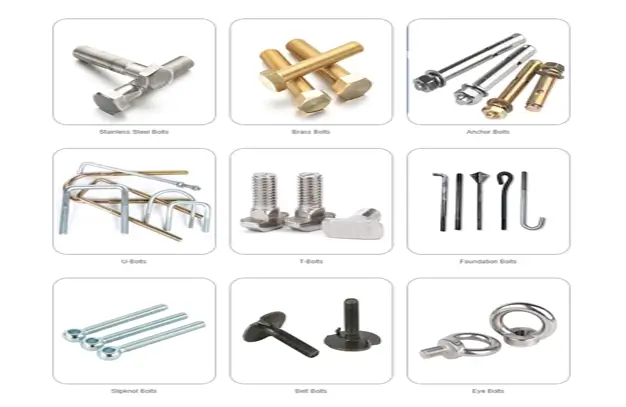Civil/Utilities
Industrial Fasteners Durable Hardware for Mechanical and Civil Engineering
Industrial fasteners are essential components used to securely join mechanical and structural elements across diverse industries. From construction and civil engineering to automotive, aerospace, and manufacturing, these versatile hardware solutions ensure stability, durability, and performance. Available in various materials and designs, such as bolts, nuts, screws, washers, rivets, and threaded rods, industrial fasteners cater to specific applications, load requirements, and environmental conditions. Their precision engineering, corrosion resistance, and adherence to quality standards make them indispensable for robust mechanical and civil projects.
Key Benefits of Industrial Fasteners
- Versatility: Applicable across mechanical, civil, automotive, and aerospace industries.
- Durability: High-strength materials ensure long-lasting performance.
- Corrosion Resistance: Ideal for challenging environmental conditions.
- Easy Installation: Designed for quick and reliable assembly.
- Customizable: Available in multiple sizes, materials, and types for specific needs.
Applications of Industrial Fasteners
- Mechanical Applications: Secure components in engines, machinery, and vehicles.
- Civil Engineering: Reinforce structures such as bridges, buildings, and pipelines.
- Aerospace and Automotive: Provide precision and reliability under dynamic conditions.
- Manufacturing Processes: Support the assembly of industrial equipment and tools.
Key Features of Industrial Fasteners
- Material Variety: Available in stainless steel, alloy steel, and non-metallic options.
- Wide Range: Includes bolts, screws, nuts, washers, rivets, and anchors.
- Strength: High load-bearing capacity for critical applications.
- Compliance: Meets international quality and torque specifications.
- Customization: Tailored solutions for unique project requirements.
With Industrial Fasteners, you ensure secure, reliable connections for mechanical and civil engineering applications.
Crafted from durable, high-strength materials, these fasteners are designed to meet the rigorous demands of industries like construction, automotive, and aerospace. Whether it’s bolts, screws, nuts, or washers, each fastener is precision-engineered to deliver exceptional performance under various load and environmental conditions. Easy to install and available in a wide range of sizes and types, Industrial Fasteners make your assembly and construction processes seamless and efficient.
FAQ questions for Industrial Fasteners
When selecting fasteners, consider factors like material compatibility, environmental conditions (e.g., moisture or temperature), load requirements, thread type, and the specific application (e.g., structural, automotive, or mechanical use). Proper sizing and torque specifications are also critical for safety and durability.
Some fasteners, like nuts and bolts, can be reused if they are undamaged and meet the necessary specifications. However, fasteners exposed to high stress, wear, or corrosion should be replaced to ensure safety and integrity.
Fasteners are hardware devices used to join components. Common types include bolts, nuts, screws, and washers, available in various materials like steel, brass, and aluminum. Understanding thread types, load capacities, and installation techniques is essential for proper usage.
Fasteners can fail due to improper installation, over-tightening, material fatigue, corrosion, or exceeding their load capacity. Regular inspection and adherence to torque specifications help prevent failure.
Grade 8 bolts are among the strongest commonly available fasteners, made from high-strength steel with a tensile strength of 150,000 psi. For specific applications, titanium or specialty alloys may offer even greater strength.
Fastener tension is influenced by factors such as torque applied during installation, material elasticity, thread friction, and external forces like vibration or thermal expansion.
Fasteners often fail at the thread roots or shank, where stress concentration is highest. This is especially true for bolts under tension or shear forces.
Bolt failure is typically caused by overloading, fatigue from repetitive stress, corrosion, improper installation, or poor-quality materials. Ensuring proper torque and maintenance helps mitigate these issues.
Common defects include improper threading, surface cracks, dimensional inaccuracies, and material flaws. Defects can lead to reduced strength and reliability, emphasizing the importance of quality control during manufacturing.
Fasteners may loosen due to vibration, thermal expansion, or insufficient torque during installation. Using locking mechanisms, such as lock washers or thread lockers, can help secure fasteners in place.

